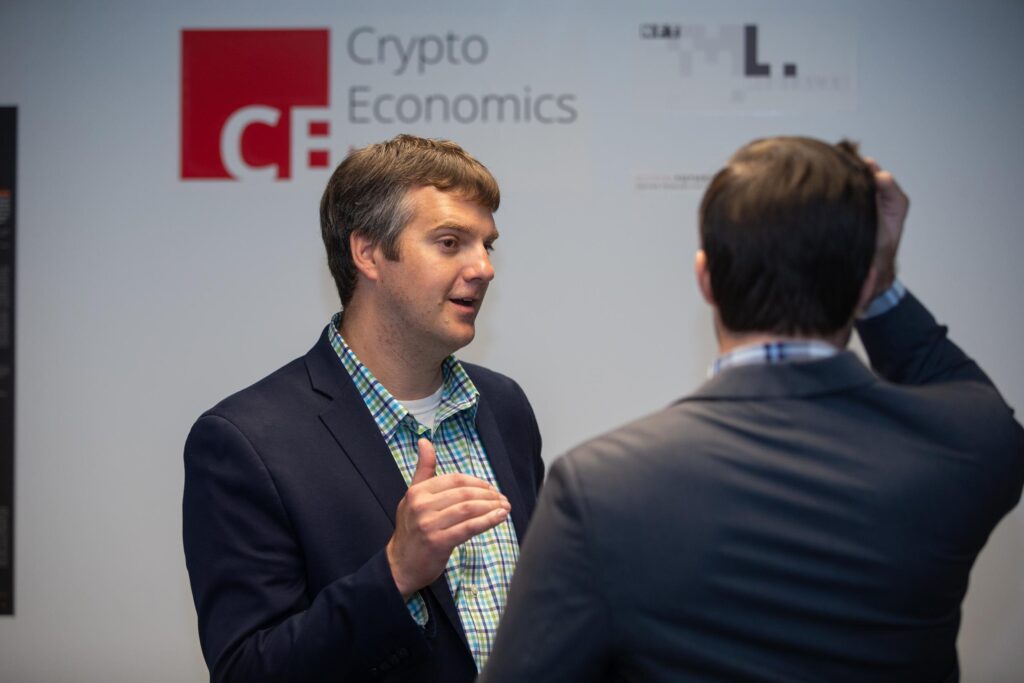
Michael Jones speaks to a visitor to the UC Digital Futures cryptoeconomics lab. Credit: Andrew Higley/UC Marketing + Brand
A prediction market has proven to be more accurate in predicting the 2024 presidential election than traditional polls and pundits. Prediction markets, also called betting markets, are where contracts that depend on the occurrence of future events can be traded.
The potential shown by this success in forecasting elections, along with a more crypto-friendly administration, could lead to greater adoption of them, said a University of Cincinnati economist.
Michael Jones, Ph.D., assistant professor of economics at the Carl H. Lindner College of Business and director of the Cryptoeconomics Lab at UC Digital Futures, said the success of a blockchain-based prediction market, Polymarket, in predicting the outcome of the elections showed that cryptocurrencies and blockchain technologies have more potential than just investments.
“What’s exciting is you’re seeing a real-world use case that’s getting a lot of attention that shows the value and utility of using a blockchain,” Jones said.
Polymarket is the world’s largest prediction marketplace. Users can take a position on whether or not an event occurs. If they’re right, they get paid instantly. It is based on blockchain, an immutable digital ledger of economic transactions that records not only financial transactions, but everything of value, in a global, verifiable system.
As Election Day approached, Trump’s stock was trading at around 60 cents on the dollar on Polymarket. Those who bet on Trump made a profit of about 40 cents per share once he won the election.
The market gave Trump a greater chance of winning than most polls, which had the election close to 50-50 and were closer to the final Electoral College tally.
“Polls only reflect people’s opinions; experts had their opinions, but there are really no consequences if they are wrong,” Jones said. “Maybe they got a little bit of criticism from the media. But if you get the prediction market wrong, you lose significant amounts of money.
“What people have started to realize is that these prediction markets contain information, so we should take them seriously.”
Prediction markets can also be used for more practical questions, Jones said.
For example, companies have used them to assess the likelihood of a product being launched in the coming year. Typically, employees are encouraged to present optimistic outlooks to their employers. Prediction markets are more likely to get an unbiased opinion.
“The good thing is that it relies on the wisdom of the crowd,” Jones said. “If everyone is able to use their own secret information, their own personal experiences of what they know, that kind of brings all the individuals together and really puts money on the line.
“What you’re really doing is democratizing information gathering.”
Additionally, some companies have used prediction markets to hedge against risks, Jones said. They could take a position that would benefit them if something happened, such as a natural disaster or an adverse court ruling, that would otherwise harm their business.
The Defense Advanced Research Projects Agency (DARPA), part of the U.S. Department of Defense, has experimented with using prediction markets to predict events such as terrorism, coups, and recessions.
Discover the latest in science, technology and space with more than 100,000 subscribers who rely on Phys.org for daily information. Sign up for our free newsletter and receive updates on the breakthroughs, innovations and research that matter:daily or weekly.
The DARPA project was controversial because there were objections to people profiting from tragedies such as terrorism. Yet others argue that the knowledge gained from the prediction market is more valuable than the potential downsides.
“Economists have taken both sides,” Jones said. “If you need to release this information, are you willing to accept that the trade-off is that someone can take advantage of the greater likelihood that you can save lives, because you know there is a high probability for an event to occur?”
Over the past two years, the Commodities Futures Trading Commission has banned U.S. citizens from participating in certain prediction markets. However, Jones said it would be naive to think Americans haven’t participated, including in the election prediction market, because tools such as virtual private networks allow users to hide their location online.
During the Joe Biden presidential administration, the U.S. government, including the Securities and Exchange Commission, has been aggressive in prosecuting cryptocurrency companies and implementing regulations. There will likely be fewer regulations under the Trump administration, Jones said.
“A lot of investors are expecting a lot of these cases to be abandoned,” he said. “I believe that a lot of the regulations regarding crypto companies located in the United States will be improved, which will open up more economic activities for these companies.”
Jones expects it will be easier for cryptocurrency companies to establish themselves in the United States and expand their operations there. He also expects more businesses and individuals to adopt cryptocurrencies as an asset class.
Provided by the University of Cincinnati
Quote: Election results show potential of prediction markets and blockchain, economist says (December 6, 2024) retrieved December 8, 2024 from
This document is subject to copyright. Except for fair use for private study or research purposes, no part may be reproduced without written permission. The content is provided for informational purposes only.




